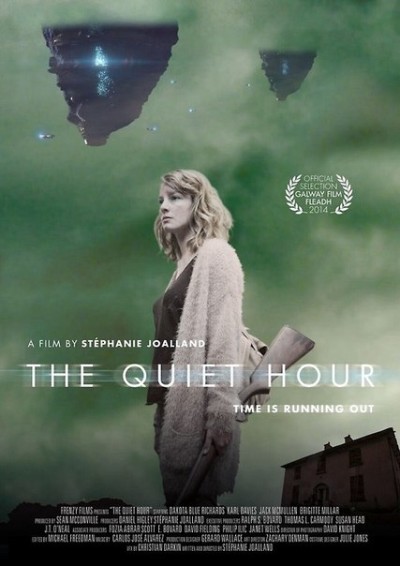★★★
“The post-apocalyptic horse whisperer.”
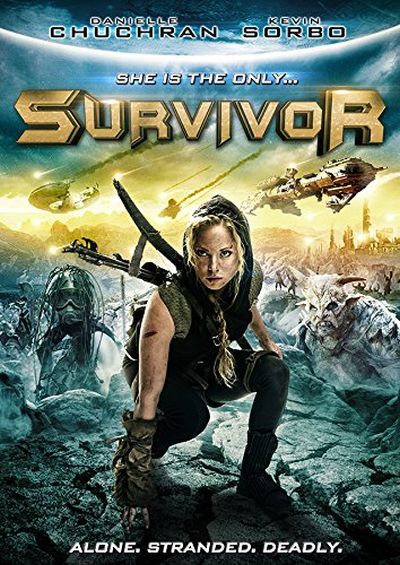 Arrowstorm Entertainment appear to have quietly become a minor creator of action heroine flicks. We’ve previously written about several entries in their Mythica series, and also Cyborg X, but seem to have missed this one. As in Mythica, the “name” star here is Hercules himself, Sorbo, who plays Captain Hunter. He’s in charge of one of seven interstellar ships, dispatched from Earth after the conditions for life here became increasingly precarious. Having spent four decades in space, they pick up a message, but when attempting to reach its source, go through a wormhole and their shuttle craft disintegrates. Hunter and his crew are scattered across the surface; with the captain having a broken leg, it’s up to his most highly-trained recruit, Kate Mitra (Chuchran) to rescue him.
Arrowstorm Entertainment appear to have quietly become a minor creator of action heroine flicks. We’ve previously written about several entries in their Mythica series, and also Cyborg X, but seem to have missed this one. As in Mythica, the “name” star here is Hercules himself, Sorbo, who plays Captain Hunter. He’s in charge of one of seven interstellar ships, dispatched from Earth after the conditions for life here became increasingly precarious. Having spent four decades in space, they pick up a message, but when attempting to reach its source, go through a wormhole and their shuttle craft disintegrates. Hunter and his crew are scattered across the surface; with the captain having a broken leg, it’s up to his most highly-trained recruit, Kate Mitra (Chuchran) to rescue him.
Which would be fine, if that’s what it was. The first half of the film, in particular the section which has Mitra battling her way across the unforgiving landscape, and against the creatures (both humanoid and… not so much) who inhabit the planet, is actually pretty good. Chuchran looks thoroughly convincing, possessing actual muscle tone; the production makes good use of the Utah landscapes; and the lack of dialogue here may well work to the movie’s benefit. It’s undeniably a distraction how evolution on this alien solar system managed to produce something looking exactly like a horse. This is explained… but I have to say, the reason is something I had strongly suspected before it was delivered, and had been hoping I was wide of the mark.
Sadly, I wasn’t, and the film’s second half is considerably weaker. This stops focusing on its main strength – the heroine – and doesn’t live up to the poster tag-lines which use both the words “only survivor” and “alone”. She turns out to be neither, and the plot disintegrates into some kind of squabble between the tribes of local inhabitants, along with a couple of (somewhat convincing) monsters. Combine this with the explanation mentioned above, and my interest evaporated – in the same way the oceans back on Earth apparently had, according to Kate’s opening voice-over. Rather than going in an original direction, as had been the case earlier on, the influences become painfully obvious, and this film does not benefit in any such comparison.
From the technical point of view, this isn’t too bad, especially considering the budget was so low, a significant fraction came through Kickstarter. It mixes CGI and practical effects to generally decent effect; the odd shot looks ropey, and some of the “mutants” are a little Halloween-esque, but I’m gradually learning that comes with the Arrowstorm territory. There is just a strong sense of unfulfilled potential; in Chuchran, they had someone who could have been capable of carrying the entire film on her own. To see her character largely shuffled off to the side during the latter stages was a bit of a disappointment, and I hope future projects will offer her the opportunity she appears to deserve, based on a solid showing here.
Dir: John Lyde
Star: Danielle Chuchran, Kevin Sorbo, Rocky Myers, Ruby Jones





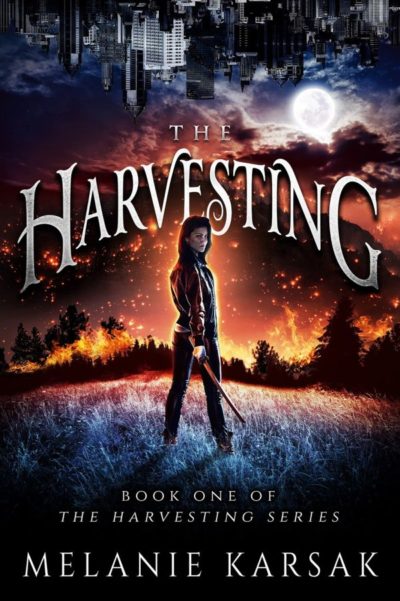 This is likely the kind of book you enjoy rather than appreciate. While no-one will ever mistake this for great literature – you could go with “ludicrous nonsense,” and I’d not argue much – it’s a fun enough bit of pulp fiction that I kept turning the pages.
This is likely the kind of book you enjoy rather than appreciate. While no-one will ever mistake this for great literature – you could go with “ludicrous nonsense,” and I’d not argue much – it’s a fun enough bit of pulp fiction that I kept turning the pages.  Well, I’m guessing it’s the first, anyway. Low-budget SF isn’t something for which Netherlands cinema has lately been renowned. Indeed, even for – science-fiction in general, Boy 7 is about the only other recent feature-length example coming to mind. So getting an email giving me a heads-up about it, pointing me in the direction of this trailer was a bit of a surprise. Here’s the synopsis:
Well, I’m guessing it’s the first, anyway. Low-budget SF isn’t something for which Netherlands cinema has lately been renowned. Indeed, even for – science-fiction in general, Boy 7 is about the only other recent feature-length example coming to mind. So getting an email giving me a heads-up about it, pointing me in the direction of this trailer was a bit of a surprise. Here’s the synopsis: Maybe the makers of this should just have been honest, and called it Terminaliens. For the amount of wholesale theft that has gone on here is really quite staggering. It takes place in the nearish future after a weapons research program goes haywire, and the cyborg results start attacking humans all over the globe. It’s up to a band of freedom fighters to attack the central computer complex and disable the system before humanity is entirely wiped out. Through in an adorable moppet young girl, who falls under the protection of the heroine, along with some crawling through air-ducts, and you’ve got a homage to James Cameron – back when he was good, rather making three-hour epics about doomed icebergs.
Maybe the makers of this should just have been honest, and called it Terminaliens. For the amount of wholesale theft that has gone on here is really quite staggering. It takes place in the nearish future after a weapons research program goes haywire, and the cyborg results start attacking humans all over the globe. It’s up to a band of freedom fighters to attack the central computer complex and disable the system before humanity is entirely wiped out. Through in an adorable moppet young girl, who falls under the protection of the heroine, along with some crawling through air-ducts, and you’ve got a homage to James Cameron – back when he was good, rather making three-hour epics about doomed icebergs.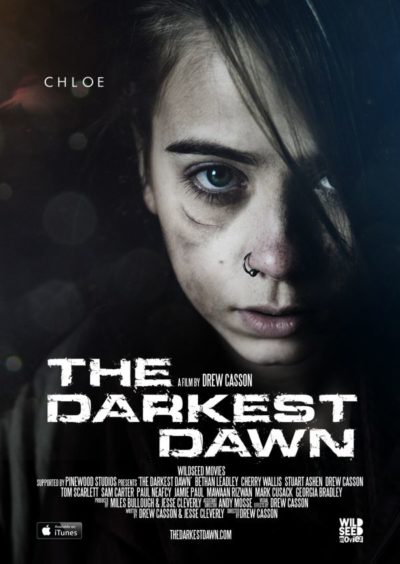 This is apparently a sequel to a previous movie about an alien invasion of Earth (and, specifically, the United Kingdom) from the same director, Hungerford. While I haven’t seen it, this likely didn’t impact things too much here; I sense it’s perhaps closer to a separate story, unfolding in the same universe, than a true sequel. It’s the story of teenage sisters Chloe (Leadley) and Sam (Wallis), with the former getting a video camera for her birthday – just in time for said invasion to kick off, with their family being separated in the ensuing chaos. Toting her camera, Chloe and her sibling take shelter, then scurry through the blasted landscape, facing the threat not just of the extra-terrestrials, but renegade bands of survivors. For it also turns out Chloe, specifically her blood, is a key to the resistance. What are the odds?
This is apparently a sequel to a previous movie about an alien invasion of Earth (and, specifically, the United Kingdom) from the same director, Hungerford. While I haven’t seen it, this likely didn’t impact things too much here; I sense it’s perhaps closer to a separate story, unfolding in the same universe, than a true sequel. It’s the story of teenage sisters Chloe (Leadley) and Sam (Wallis), with the former getting a video camera for her birthday – just in time for said invasion to kick off, with their family being separated in the ensuing chaos. Toting her camera, Chloe and her sibling take shelter, then scurry through the blasted landscape, facing the threat not just of the extra-terrestrials, but renegade bands of survivors. For it also turns out Chloe, specifically her blood, is a key to the resistance. What are the odds?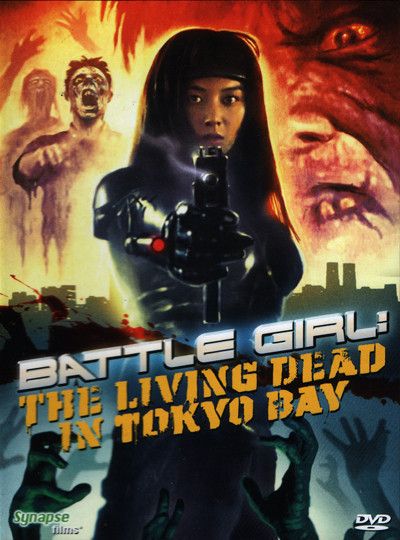 A meteor crashes into Tokyo Bay, creating a cloud of “cosmo-amphetamine” that infects everyone in the area. When they die, that drug immediately takes over, bringing them back to life as flesh-eating zombies. Colonel Kirihara is leading the rescue mission, and sends his daughter, K-ko (Suzuki) into the contaminated zone to scope things out. She finds that one of his underling, Captain Fujioka, is using the chaos to carry out human experiments, deliberately infecting survivors with the cosmo-amphetamine, in order to turn them into an unstoppable force of undead soldiers. He’s not willing to let anyone get out alive, least of all K-ko. Fortunately, her father gave her a battle suit, which helps to even the odds against the living dead army she faces.
A meteor crashes into Tokyo Bay, creating a cloud of “cosmo-amphetamine” that infects everyone in the area. When they die, that drug immediately takes over, bringing them back to life as flesh-eating zombies. Colonel Kirihara is leading the rescue mission, and sends his daughter, K-ko (Suzuki) into the contaminated zone to scope things out. She finds that one of his underling, Captain Fujioka, is using the chaos to carry out human experiments, deliberately infecting survivors with the cosmo-amphetamine, in order to turn them into an unstoppable force of undead soldiers. He’s not willing to let anyone get out alive, least of all K-ko. Fortunately, her father gave her a battle suit, which helps to even the odds against the living dead army she faces. Having used my entire quota of hyphens for this review in that tag-line, what do we have here? I could remember virtually nothing about the original, even though it was only a couple of years ago we reviewed it. Seems to have ended up with the same vaguely mediocre rating though. The problem here, however, is mostly one of pacing. After a brief flurry of impressive activity at the beginning, there’s not much happening on the action front for about an hour, and what takes its place falls short of adequate entertainment.
Having used my entire quota of hyphens for this review in that tag-line, what do we have here? I could remember virtually nothing about the original, even though it was only a couple of years ago we reviewed it. Seems to have ended up with the same vaguely mediocre rating though. The problem here, however, is mostly one of pacing. After a brief flurry of impressive activity at the beginning, there’s not much happening on the action front for about an hour, and what takes its place falls short of adequate entertainment.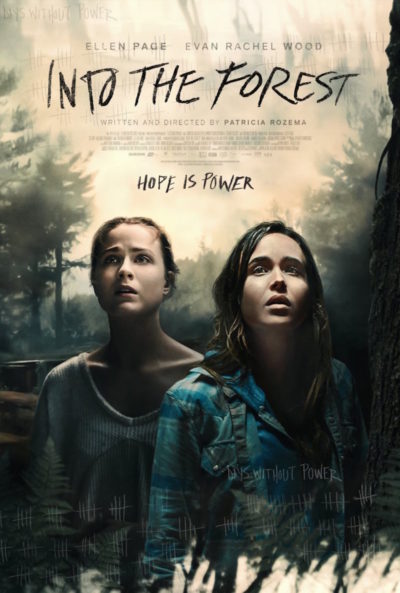 Nell (Page) and Eva (Wood) are sisters, living in a house deep in the woods with their father (Rennie). Nell is studying for her SATs, Evan is working towards a dance audition, until all plans are interrupted by a catastrophic power outage which leaves the entire country without electricity. Fortunately, they are almost self-sufficient, capable of living off the land as far as food and heat is concerned, even if the lack of power and very limited fuel forces some significant changes in lifestyle: Eva is reduced to practicing her dance routine to the relentless tick of a metronome, for instance. But when the women are thrown entirely onto their own resources, life becomes tougher, and various hard questions have to be answered, about whether to stay in their remote, apparently fairly safe location, or follow the reports suggesting that the Eastern seaboard may slowly be getting back to normal.
Nell (Page) and Eva (Wood) are sisters, living in a house deep in the woods with their father (Rennie). Nell is studying for her SATs, Evan is working towards a dance audition, until all plans are interrupted by a catastrophic power outage which leaves the entire country without electricity. Fortunately, they are almost self-sufficient, capable of living off the land as far as food and heat is concerned, even if the lack of power and very limited fuel forces some significant changes in lifestyle: Eva is reduced to practicing her dance routine to the relentless tick of a metronome, for instance. But when the women are thrown entirely onto their own resources, life becomes tougher, and various hard questions have to be answered, about whether to stay in their remote, apparently fairly safe location, or follow the reports suggesting that the Eastern seaboard may slowly be getting back to normal.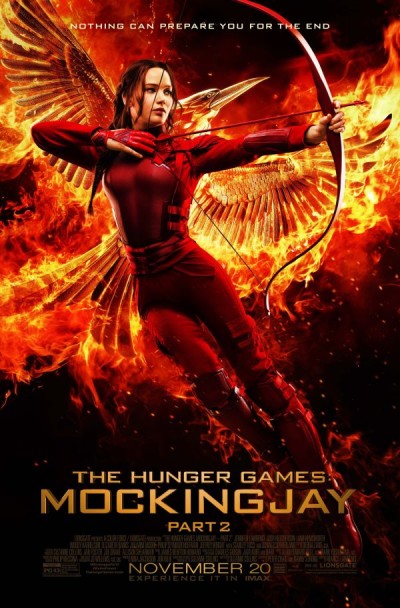 Unlike the adventures of our schoolboy wizard, where the final installment took the most at box-office, this was the least successful of the Hunger Games movies. And I can see why: almost without exception, it’s a relentless downer, rather than a grandstanding finale. I have not, to this point, read the book on which it is based, so can’t say how accurately this cynical tone reflects the novel, but based on the movie, let’s just say, politicians as a species do not come out of it with a glowing portrayal! It begins immediately after the end of the events of Part 1, when Katniss (Lawrence) was attacked by brainwashed ally Peeta (Hutcherson). Meanwhile, the rebellion gains momentum and territory, as they head towards the Capitol. Katniss’s role is now as a ‘Joan of Arc’, a rally point, and she is sent into the Capitol as part of a propaganda squad. However, she subverts the mission, claiming secret orders to assassinate President Snow, although it becomes clear that the lines between “good” rebels and “evil” establishment are increasingly vague.
Unlike the adventures of our schoolboy wizard, where the final installment took the most at box-office, this was the least successful of the Hunger Games movies. And I can see why: almost without exception, it’s a relentless downer, rather than a grandstanding finale. I have not, to this point, read the book on which it is based, so can’t say how accurately this cynical tone reflects the novel, but based on the movie, let’s just say, politicians as a species do not come out of it with a glowing portrayal! It begins immediately after the end of the events of Part 1, when Katniss (Lawrence) was attacked by brainwashed ally Peeta (Hutcherson). Meanwhile, the rebellion gains momentum and territory, as they head towards the Capitol. Katniss’s role is now as a ‘Joan of Arc’, a rally point, and she is sent into the Capitol as part of a propaganda squad. However, she subverts the mission, claiming secret orders to assassinate President Snow, although it becomes clear that the lines between “good” rebels and “evil” establishment are increasingly vague.